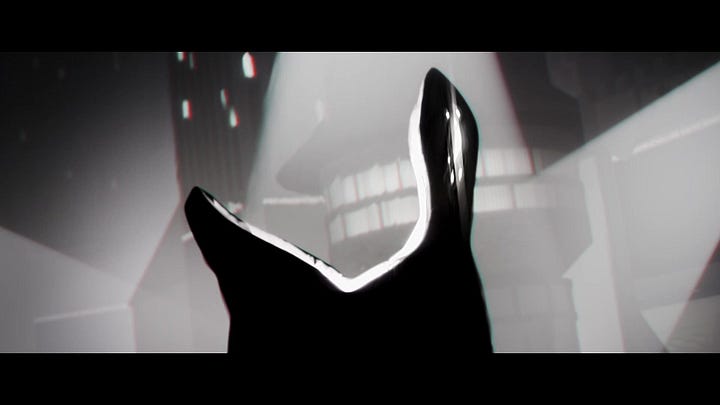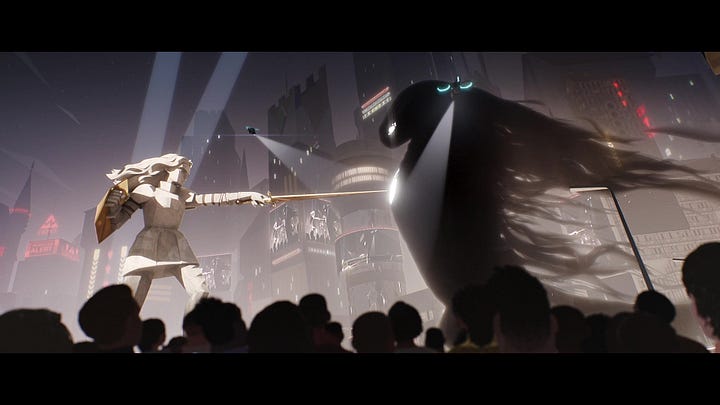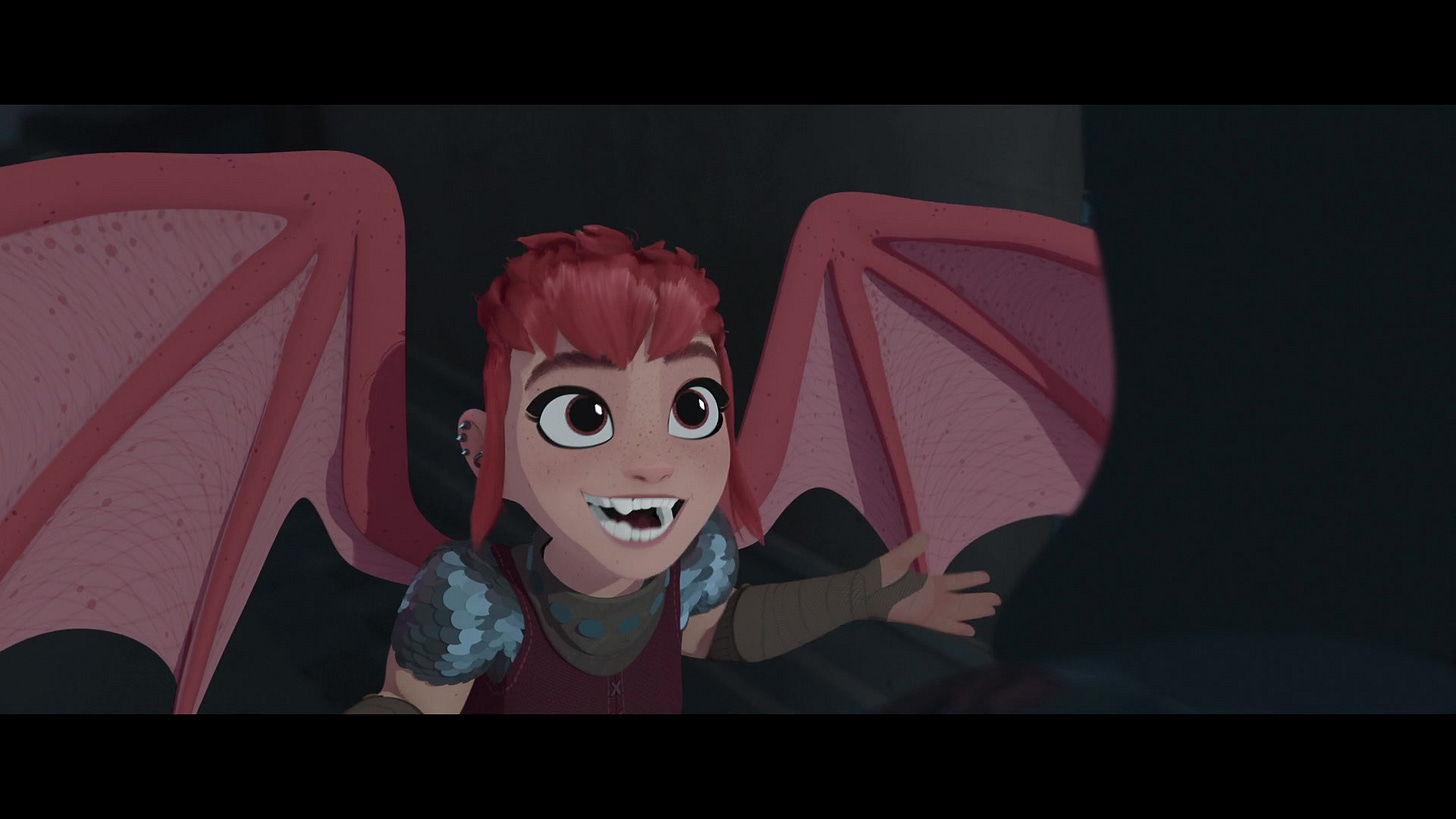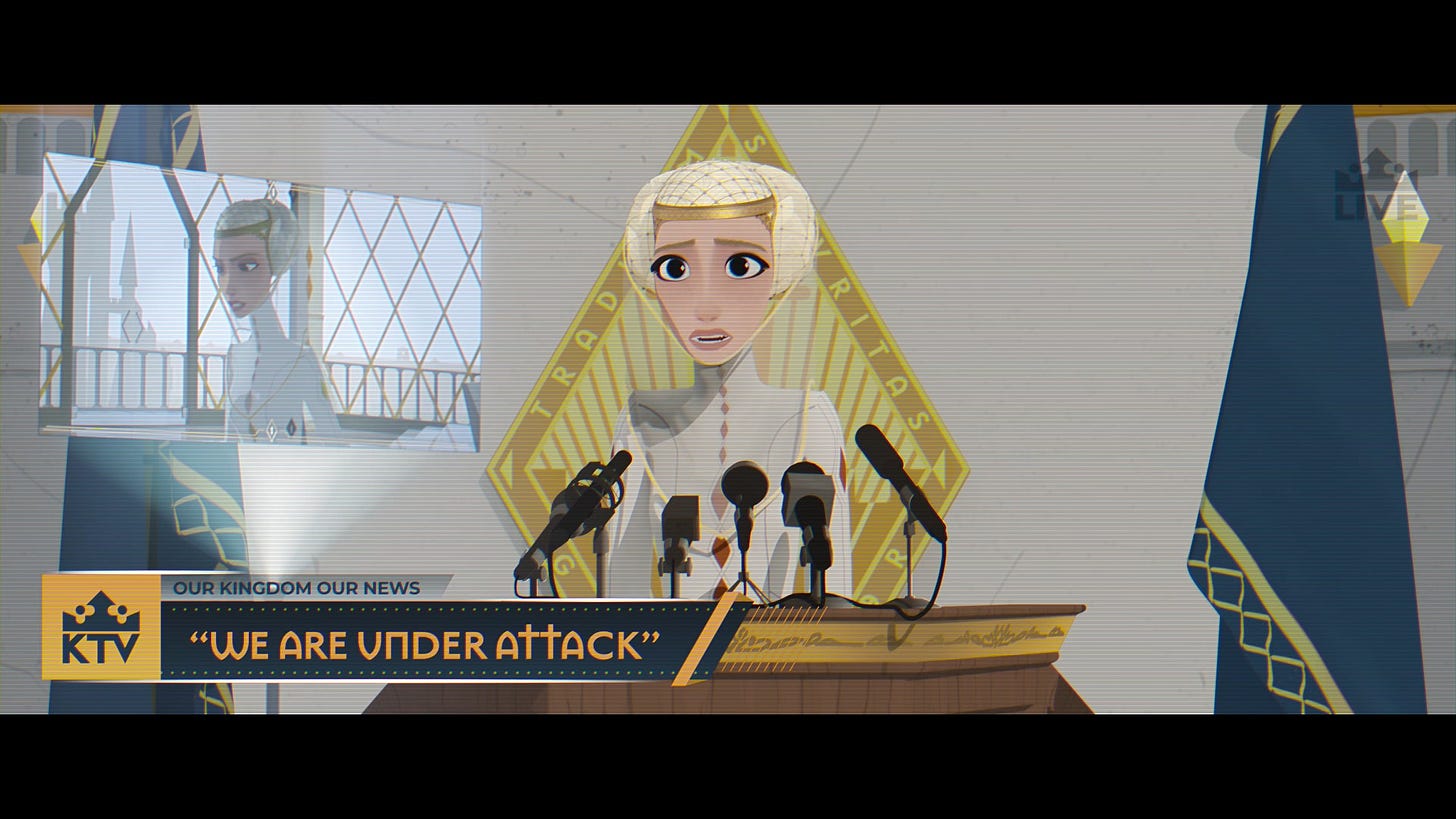Content warning: This review touches briefly on the topic of suicide.
Way back in the distant past of 2012, I was a Tumblr kid. For the uninitiated, Tumblr is a blogging website/social media platform that utilized lots of different types of media, and was, for a time, the absolute epicenter of fandom culture on the internet. After several sales of the website and attempts to make it profitable, it’s a shell of its former self, but back in 2012, Tumblr was at the height of its popularity. One of my favorite things I discovered on the site around this time was a webcomic called Nimona. It followed a shapeshifter of the same name on her adventures with the supposedly-villainous Lord Ballister Blackheart. The story, which developed as the comics were released, dealt with themes of queerness, identity, and institutional power. I was immediately hooked. In 2015, the series was compiled into a graphic novel which I purchased right away.
20th Century Fox acquired the rights for an animated film the same year the graphic novel came out and announced in 2017 that it would be released on Valentine’s Day 2020. Unfortunately, Fox was absorbed into the behemoth *coughmonopolycough* that is the Walt Disney Company in 2019. Delays plagued the production, and despite reports that the film was very-nearly complete, it was unceremoniously cancelled in 2021. Though Disney might have preferred audiences to believe that the cancellation of the project was due to the COVID-19 pandemic, several staff members confirmed that they had received pushback from the company on the queer themes, and, in particular, a same-sex kiss between two of the lead characters.
Fortunately, Annapurna Pictures picked up the film, which was finally released on Netflix in June of last year. I know this seems like a lot of backstory for what is ostensibly a film review, but I think the production history, as well as the personal history of the author play a significant role in how Nimona found herself transformed once again, this time from a quietly queer webcomic to once of the most honest portrayals of the transgender experience in the modern era that I’ve seen. You see, not only was there a dramatic shift in the political landscape surrounding transgender issues in-between 2015 and 2023, but the author also came to terms with his own transmasculinity during that time as well. Now going by Nate or ND and using he/him pronouns, Stevenson has gone on the record discussing how Nimona was always a power-fantasy for him, and I think that’s really evidenced in how the graphic novel was adapted for film.
In the film, Ballister Blackheart becomes Ballister Boldheart, our protagonist. He’s a student at the Institute, a medieval-futurist organization that trains knights to protect their kingdom from monsters that roam beyond the high walls that surround it. Ballister (voiced, somehow, with a combination of world-weariness and optimism by Riz Ahmed) is the first commoner to ever be knighted at the Institute, but when he is framed for the assassination of the Queen, he finds himself flung onto a crash course with Nimona.
Nimona (in a delightfully high-energy turn from Chloe Grace Moretz) is a shapeshifter with a penchant for chaos, and she is the primary vehicle through which Stevenson plays out the aforementioned power-fantasy; unsurprisingly, many trans folks find themselves wishing for shapeshifting powers to give themselves the form that truly reflects who they are.
But the thing that makes this movie really special isn’t in the fantasy that Nimona’s powers provide to gender non-conforming people, it’s in the honest reality of our lives that the story portrays. You see, Nimona may love her powers, but the world is cruel and hostile to her. The kingdom is surrounded by a giant wall to protect itself from monsters and, in the minds of its citizens, this includes Nimona. Even the hero of the tale, Ballister, is suspicious of her until he gets to know her. The reason for this is very simple: the Institute produces constant propaganda about monsters, instilling the kingdom with fear. The common folks’ understanding of Nimona is tarnished by the lessons they have been taught by the Institute for centuries, and so they reject her.
In the final act of the movie, this comes to a head when the Director of the Institute publicly demonizes Nimona and throws into question her friendship with Ballister. Watching these scenes, it’s hard not to see the obvious parallels to the attacks that trans people are experiencing in real life.
Nimona’s fear and rage overtake her, and she transforms into a giant beast and attempts to impale herself on the sword of the giant statue of the kingdom’s monster-slaying hero, Gloreth. Seeing no way forward in a world that doesn’t want her, Nimona can see no other option besides suicide.


The first time I saw this movie, I cried through this entire sequence. Nimona’s grief at being constantly demonized, and her anguish at being turned on by someone she called a friend, is palpable. It’s all too familiar to trans people who constantly hear ourselves vilified on the news and internet, in state houses and family homes. It’s all too real to a community with an 82% suicidality rate.
To see this complex issue portrayed so deftly in an animated film was surprising, moving, and—in a way—hopeful. The film portrays such an honest and accessible depiction of what trans folks deal with in the modern political landscape, and the fact that a transmasculine writer was able to find the production company, animators, directors, and writers to help him bring it to the screen is nothing short miraculous to me.
I believe in the power of art to change hearts and minds, and I really think Nimona and other stories like it have the potential to help more folks see trans people in a different light. Americans are not so dissimilar to the citizens of the kingdom, after all; both inundated with propaganda about those who are different and made to fear what they don’t understand. In Nimona, the heroine saves the kingdom and the Institute’s lies are exposed. People begin to travel outside of the walls to see for themselves what the truth is, and Nimona herself becomes beloved by those who once feared her. I truly believe that the same is possible for trans people, if you’ll only take the time to listen to and share our stories.
Nimona is streaming on Netflix.










https://youtu.be/i4CFWTYFRlw?si=HxbIPz4uNKiHfs5L
Heard it’s until the 26th USA.